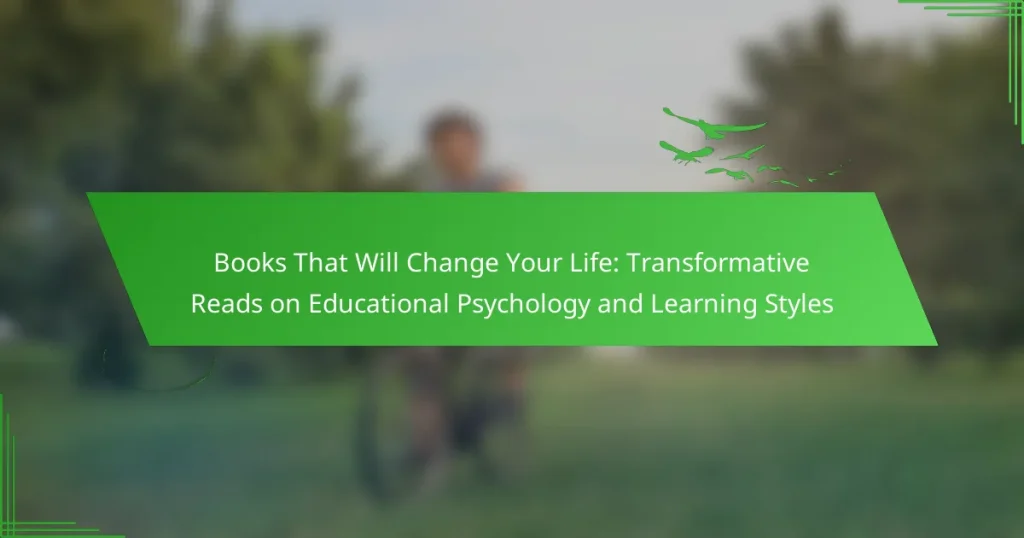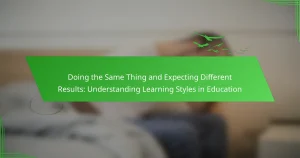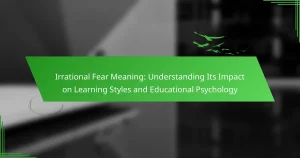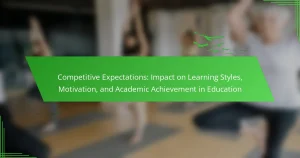Transformative books on educational psychology can significantly enhance your understanding of learning styles and teaching strategies. This article explores how educational psychology tailors approaches to individual needs, the impact of unique learning styles on teaching, and rare theories that promote personalized education. Readers will discover evidence-based techniques to apply in their own learning environments, fostering engagement and improving academic outcomes.
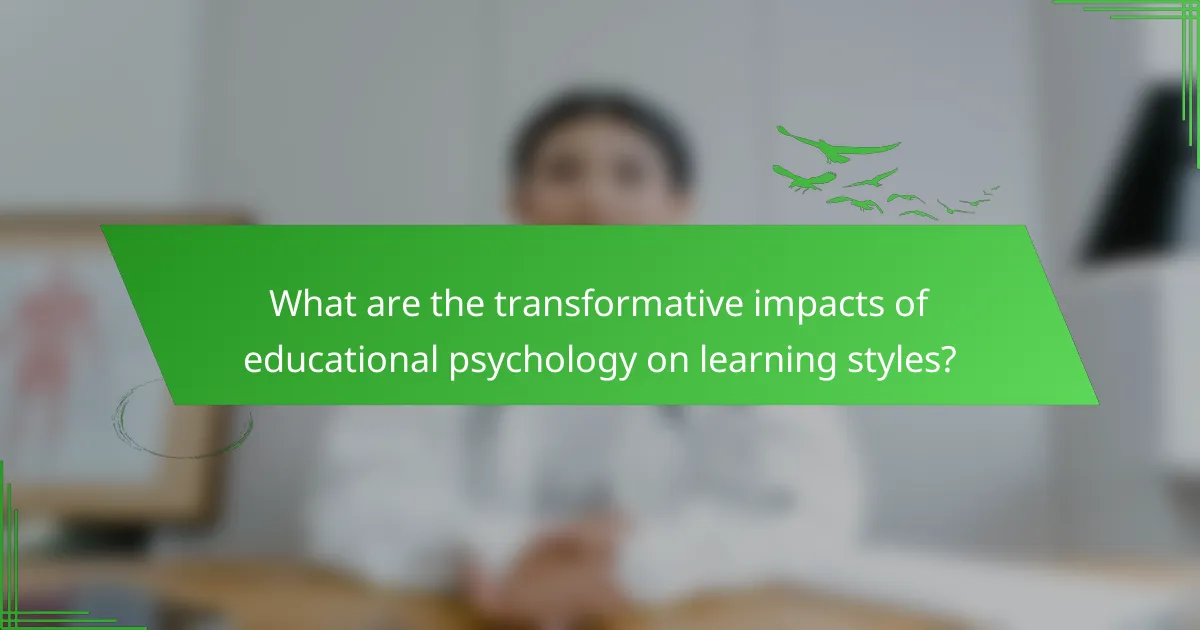
What are the transformative impacts of educational psychology on learning styles?
Educational psychology significantly transforms learning styles by tailoring approaches to individual needs. It emphasizes understanding cognitive processes, which enhances engagement and retention. Research shows diverse learning styles, such as visual, auditory, and kinesthetic, benefit from specific strategies. For instance, visual learners excel with diagrams, while kinesthetic learners thrive in hands-on activities. These insights lead to personalized education, fostering better academic outcomes. Ultimately, educational psychology empowers educators to adapt their methods, creating inclusive learning environments that cater to all students.
How do different learning styles influence educational outcomes?
Different learning styles significantly influence educational outcomes by tailoring the learning experience to individual preferences. For instance, visual learners benefit from diagrams and charts, enhancing retention. Kinesthetic learners excel through hands-on activities, which improve engagement and understanding. Auditory learners thrive in discussions and lectures, leading to better comprehension. Research indicates that aligning teaching methods with these styles can increase student performance by up to 30%. Recognizing these differences allows educators to implement diverse strategies, fostering a more inclusive learning environment.
What role does motivation play in learning styles?
Motivation significantly influences learning styles by shaping how individuals engage with educational material. High motivation enhances the effectiveness of various learning styles, enabling deeper understanding and retention. For instance, motivated learners often adopt active learning strategies, which align well with experiential and kinesthetic styles. Research indicates that intrinsic motivation correlates with improved academic performance across diverse educational settings. Understanding this relationship helps educators tailor approaches to maximize student engagement and learning outcomes.
What are the key motivational theories relevant to educational psychology?
Key motivational theories relevant to educational psychology include Maslow’s Hierarchy of Needs, Self-Determination Theory, and Expectancy Theory. These theories emphasize the importance of meeting basic needs, fostering intrinsic motivation, and understanding the relationship between effort and expected outcomes. Each theory provides insights into how motivation influences learning and educational practices.
How can books enhance motivation for varied learning styles?
Books enhance motivation for varied learning styles by providing diverse perspectives and tailored content. They cater to visual, auditory, and kinesthetic learners through illustrations, narratives, and interactive exercises. For instance, “Mindset” by Carol Dweck inspires growth through examples, while “The Power of Habit” by Charles Duhigg offers insights into behavioral change. These transformative reads empower learners by addressing unique attributes of educational psychology, fostering engagement and retention. As a result, books serve as essential tools for motivating individuals across different learning styles.
What are the most influential books in educational psychology?
“Books That Will Change Your Life: Transformative Reads on Educational Psychology and Learning Styles” includes several influential titles. Key works are “Mind in Society” by Vygotsky, which explores social learning’s impact on cognition, and “How People Learn” by Bransford, offering insights into effective teaching methods. “Theories of Learning” by Schunk presents diverse learning theories, while “Multiple Intelligences” by Gardner revolutionizes understanding of diverse learner strengths. Finally, “The Courage to Teach” by Palmer emphasizes the teacher’s role in fostering learning environments. Each book significantly contributes to educational psychology, shaping teaching practices and learning strategies.
Which authors have shaped the understanding of learning styles?
Several authors have significantly influenced the understanding of learning styles. Key figures include Howard Gardner, known for his theory of multiple intelligences, and David Kolb, who developed the experiential learning theory. Additionally, Neil Fleming introduced the VARK model, categorizing learners into visual, auditory, reading/writing, and kinesthetic styles. These contributions have shaped educational psychology and informed teaching methods.
What are the core themes presented in these transformative reads?
Books that explore educational psychology and learning styles emphasize personal growth, self-awareness, and effective teaching methods. Core themes include the importance of understanding diverse learning styles, fostering emotional intelligence, and promoting critical thinking skills. These themes encourage readers to reflect on their own learning processes and adapt their approaches for better educational outcomes. Transformative reads often highlight the role of motivation and resilience in achieving personal and academic success.
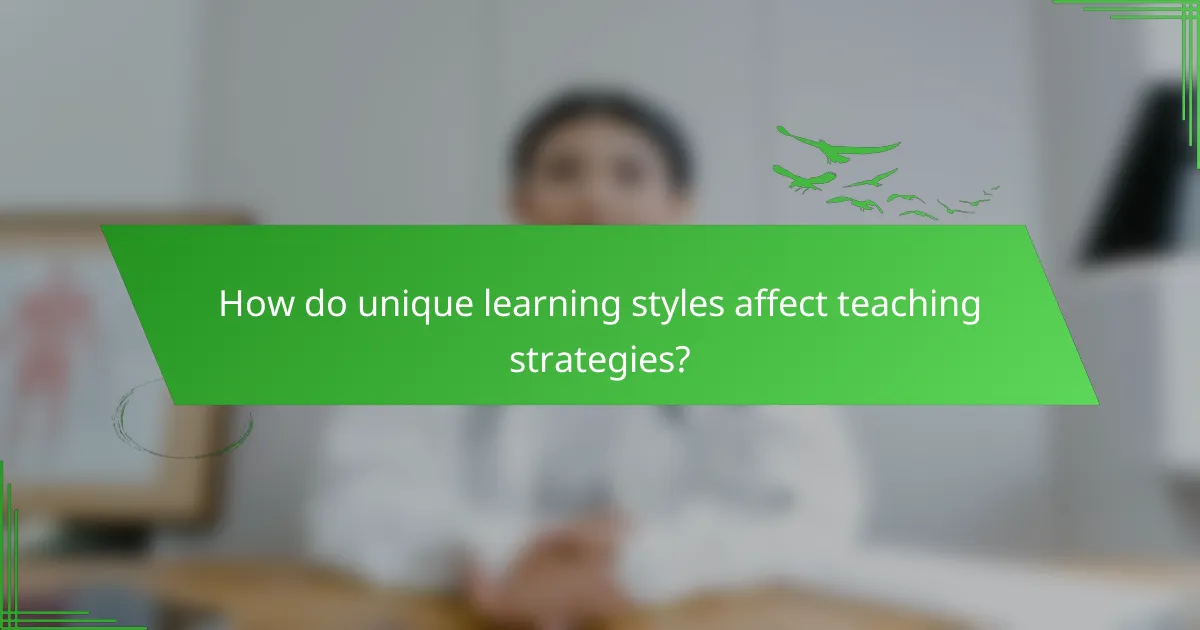
How do unique learning styles affect teaching strategies?
Unique learning styles significantly influence teaching strategies by necessitating tailored approaches. Educators must adapt methods to accommodate diverse preferences, enhancing student engagement and retention. For instance, visual learners benefit from diagrams, while auditory learners thrive with discussions. Research shows that personalized strategies improve academic outcomes, highlighting the importance of understanding these unique attributes. Transformative reads on educational psychology provide insights into effective techniques for fostering an inclusive learning environment.
What are the specific strategies for accommodating diverse learners?
Incorporating diverse learners requires tailored strategies. Utilize differentiated instruction by adapting content, process, and products to meet individual needs. Implement flexible grouping to foster collaboration among students with varying abilities. Incorporate multiple forms of assessment to gauge understanding effectively. Use culturally responsive teaching to connect learning with students’ backgrounds. Integrate technology to provide personalized learning experiences.
How can differentiated instruction be applied effectively?
Differentiated instruction can be applied effectively by tailoring teaching methods to meet diverse student needs. This approach enhances engagement and comprehension by recognizing individual learning styles.
Key strategies include using varied instructional materials, incorporating flexible grouping, and adjusting assessments. For example, visual learners benefit from graphic organizers, while kinesthetic learners thrive with hands-on activities.
Research indicates that differentiated instruction can improve student performance by fostering a more inclusive learning environment. Studies show that classrooms implementing these practices see a notable increase in student motivation and achievement.
Books on educational psychology provide insights into effective differentiation techniques, emphasizing the importance of understanding students’ unique attributes. Transformative reads such as “The Differentiated Classroom” by Carol Ann Tomlinson offer practical frameworks for educators seeking to enhance their instructional strategies.
What role does technology play in supporting unique learning styles?
Technology plays a crucial role in supporting unique learning styles by providing personalized educational experiences. Tools like adaptive learning software adjust content based on individual progress, enhancing comprehension for diverse learners. Multimedia resources cater to visual and auditory preferences, while interactive platforms foster engagement through active participation. Furthermore, data analytics offer insights into learning patterns, allowing educators to tailor their approaches effectively. Overall, technology empowers students by accommodating various learning preferences and improving educational outcomes.
What are some case studies showcasing successful implementation?
Books that focus on educational psychology and learning styles have successfully transformed teaching methodologies. Case studies highlight how “Mindset: The New Psychology of Success” by Carol S. Dweck reshaped educational approaches by promoting a growth mindset, leading to improved student performance. Another example is “The 5 Love Languages” by Gary Chapman, which has been applied in educational settings to enhance teacher-student relationships, resulting in increased engagement. “How People Learn” by the National Research Council provided evidence-based strategies that schools adopted, improving curriculum design and learning outcomes. These transformative reads demonstrate significant impacts on educational practices and student success.

What are the rare yet impactful theories in educational psychology?
Rare theories in educational psychology, such as the Constructivist Theory and the Multiple Intelligences Theory, significantly influence learning approaches. Constructivist Theory posits that learners construct knowledge through experiences, emphasizing active participation. Multiple Intelligences Theory, proposed by Howard Gardner, identifies diverse intelligences, advocating for tailored teaching methods. These theories challenge traditional paradigms, promoting personalized education that caters to individual learning styles. Their impact lies in fostering inclusive environments that recognize varied cognitive strengths, ultimately transforming educational practices.
How can lesser-known approaches reshape conventional learning methods?
Lesser-known approaches can significantly reshape conventional learning methods by introducing diverse perspectives and techniques. These transformative reads on educational psychology highlight the importance of varied learning styles, emphasizing that personalized education fosters deeper understanding and retention. For example, books like “Mindset” by Carol Dweck advocate for a growth mindset, encouraging learners to embrace challenges. Additionally, works such as “How We Learn” by Benedict Carey reveal the benefits of spaced repetition and active engagement, which contrast traditional rote memorization. Embracing these innovative strategies can lead to more effective and adaptable educational frameworks.
What insights do books on cognitive load theory provide?
Books on cognitive load theory offer insights into how information processing affects learning. They emphasize the importance of managing cognitive load to enhance educational outcomes. Key concepts include intrinsic load, extraneous load, and germane load, which help educators design effective learning experiences. For instance, reducing extraneous load can improve retention and understanding. Notable works in this field provide practical strategies for applying these principles in diverse educational settings.
What are the implications of constructivist learning theories?
Constructivist learning theories emphasize active participation, enabling learners to construct their own understanding. These theories imply that educational practices should focus on collaboration, critical thinking, and real-world problem-solving. Transformative reads on educational psychology highlight the importance of adapting teaching methods to align with these principles, fostering deeper engagement and personalized learning experiences. Books that explore these theories can provide insights into effective instructional strategies and the impact of learner autonomy on educational outcomes.
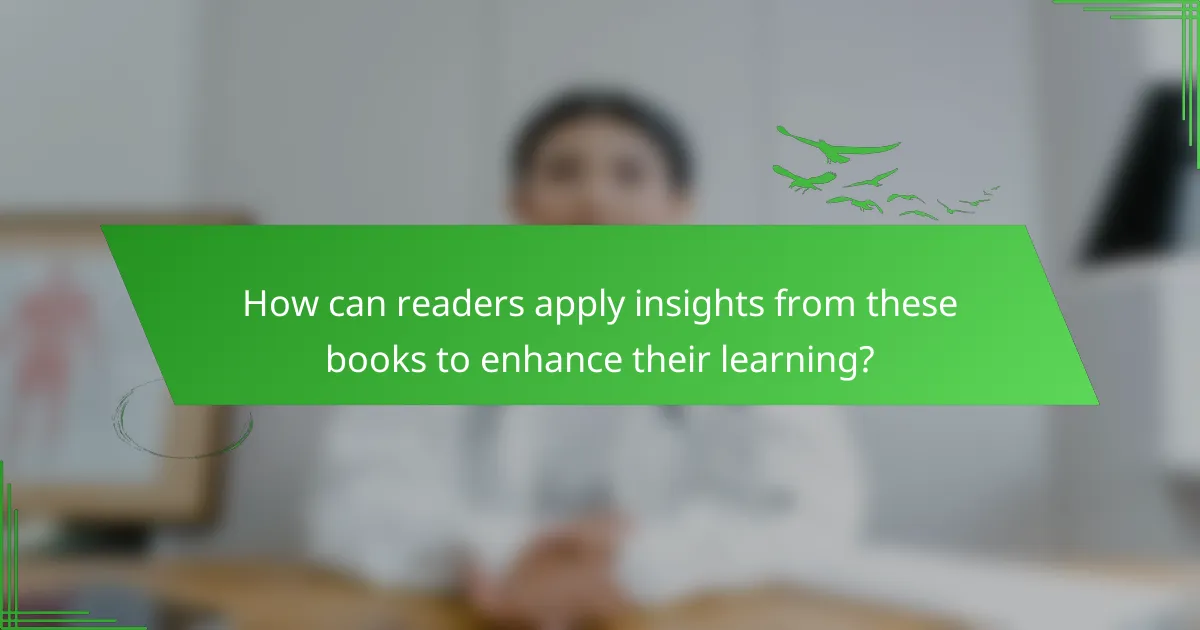
How can readers apply insights from these books to enhance their learning?
Readers can apply insights from transformative books on educational psychology to enhance their learning by adopting personalized strategies. These books provide evidence-based techniques tailored to various learning styles, enabling readers to identify their unique preferences. For example, implementing active learning methods can significantly improve retention and understanding. Additionally, leveraging concepts like growth mindset can foster resilience and adaptability in the face of challenges. Engaging with these materials encourages reflective practice, allowing readers to assess their progress and adjust their approaches effectively.
What are the best practices for integrating learning styles into daily study routines?
Integrating learning styles into daily study routines enhances retention and comprehension. Tailor study methods to individual preferences, such as visual aids for visual learners or discussions for auditory learners.
Utilize transformative books on educational psychology to deepen understanding of learning styles. For example, “Mindset” by Carol S. Dweck emphasizes the importance of adopting a growth mindset, which supports various learning approaches.
Implement active learning strategies, like summarizing information or teaching concepts to others. This reinforces knowledge across different learning styles and promotes engagement.
Regularly assess and adjust study techniques to align with evolving preferences and needs. This flexibility ensures that study routines remain effective and personalized.
What common mistakes should be avoided when exploring educational psychology?
To avoid common mistakes in educational psychology exploration, focus on critical thinking and application of theories. Many learners overlook the importance of diverse learning styles, which can hinder understanding. Another mistake is neglecting to integrate practical experiences with theoretical knowledge, leading to superficial insights. Additionally, failing to engage with current research can result in outdated perspectives. Lastly, not reflecting on personal biases may skew interpretations of educational practices.
How can educators leverage these transformative reads for curriculum development?
Educators can leverage transformative reads by integrating insights from educational psychology and learning styles into curriculum development. These books provide evidence-based strategies that enhance student engagement and learning outcomes.
For instance, applying differentiated instruction principles can cater to diverse learning styles, fostering an inclusive environment. Incorporating growth mindset concepts encourages resilience and motivation among students.
Furthermore, utilizing real-life case studies from these texts can illustrate practical applications of theories, enriching lesson plans. Regularly revisiting and updating curriculum based on these transformative reads ensures alignment with current educational practices and research.
By prioritizing these resources, educators can create dynamic and responsive curricula that meet the evolving needs of their students.
What expert tips can enhance the application of learning styles in education?
To enhance the application of learning styles in education, incorporate personalized strategies that align with individual preferences. Utilize diverse teaching methods, such as visual aids and hands-on activities, to cater to different learners. Regular assessments can help identify effective approaches and adjust techniques accordingly. Engaging students in active learning fosters deeper understanding and retention.
